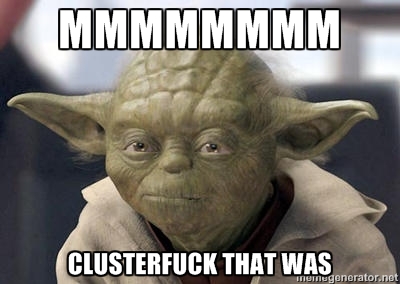I wrote a little bit about the Dunning-Kruger effect once before, and now there’s an extension of it described in The Washington Post (based on this research paper). First, let’s talk about the experiment and what it was aiming to prove:
- Two separate people are involved in the study.
- They view two successive images — almost exactly the same, but not quite.
- In one of the images, there is an “oddball target” that looks slightly different.
- The images flash by very quickly.
- Each person has to decide which image contains the “oddball target.”
- But …
- They also have to agree.
- This goes on for 256 trials.
- The two people get to know each other, and their accuracy, pretty well.
OK, got it? 256 trials. People have to agree. Over time, one person is clearly becoming better at doing it. So what happens?
The Results Of The Study
Here’s what happened:
Report the study authors, “the worse members of each dyad underweighted their partner’s opinion (i.e., assigned less weight to their partner’s opinion than recommended by the optimal model), whereas the better members of each dyad overweighted their partner’s opinion.” Or to put it more bluntly, individuals tended to act “as if they were as good or as bad as their partner” — even when they quite obviously weren’t.
Phrased another way:
By confirming themselves more often than they should have, the inferior member of each dyad may have tried to stay relevant and socially included. Conversely, the better performing member may have been trying to avoid ignoring their partner.
How does this study make work a clusterfuck?
So … think about this.
- Humans are social animals, right? Ultimately they need acceptance. It’s evolutionary to work in groups at some level, even if no one really wants to “collaborate.”
- When you’re in a group, the lower-performing members tend to speak up to, essentially, stay relevant. The better-performing people don’t want to be seen as dicks.
- See what the implications are?
- In any business meeting you sit in, there are dullards on the particular topic and experts on the particular topic (those roles could be reversed in the very next meeting).
- The manager often tries to hear from as many people as possible, and oftentimes, people like to chime in their 1-2 thoughts on the matter at hand.
- (I’ve seen studies that say typically only 3 people talk in meetings, but I personally haven’t experienced that a lot.)
So … here’s why work is a clusterfuck, in the words of The Washington Post:
Still, I think it’s pretty obvious that human groups (especially in the United States) err much more in the direction of giving everybody a say than in the direction of deferring too much to experts. And that’s quite obviously harmful on any number of issues, especially in science, where what experts know really matters and lives or the world depend on it — like vaccinations or climate change.
I’ve always thought work (and especially meetings) should be about defining roles, including “Point Person” or “Subject Matter Expert.” But far too often we try to get all these opinions and directions, which just muddles the whole thing. (And often people are ‘Armchair QB’ing,’ meaning they’re speaking about something that they have no knowledge of the process for.)
So there you have it: scientific logic behind why your office is a giant clusterfuck most of the time.
